Last Night in Soho (2021)
Directed by: Edgar Wright
Written by: Edgar Wright, Krysty Wilson-Cairns
Starring: Anya Taylor-Joy, Matt Smith, Michael Aejo, Thomasin McKenzie
UK
IN CINAMES NOW
RUNNING TIME:116 mins
REVIEWED BY: Dr Lenera
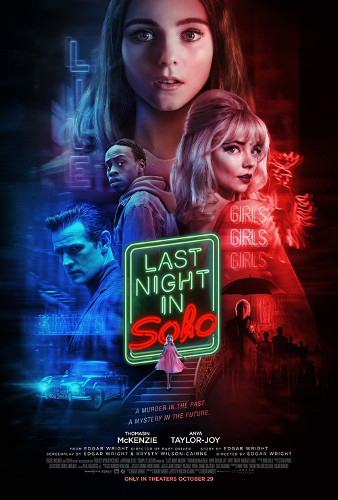
Eloise, or Ellie, is shy, innocent, wears clothes she makes herself, lives with her grandmother and is haunted by the memory of her late mother who suffered from intense mental health issues and committed suicide when she was a child. Oh, and she’s crazy about the 1960’s. She’s overjoyed when her acceptance letter arrives from the London School of Fashion, and travels up from her home in Cornwall to the city centre to study there, but becomes a target of rejection and ridicule by her roommate Jocasta, and isn’t accepted by any of her fellow students except the friendly John. She then rents a room at a bedsit and there, at night, she’s transported back to 1966, where she enters the body of Sandie, an aspiring singer who’s everything that Ellie wishes she was herself – confident, radiant, ambitious, and beautiful. Sandie is rescued one night by the friendly Jack who promises to help her. But can he be trusted? And who’s this mysterious old man who lingers in and around the pub where Eloise works?
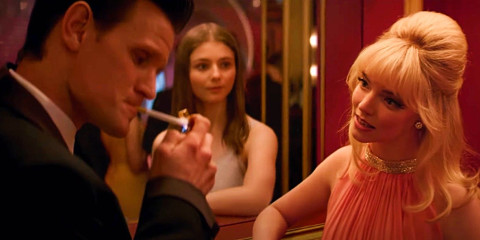
Well it’s nice to see a film that, for a change, looks to the ’60s rather than the ’80s, but how much you enjoy may depend Edgar Wright’s latest may partly depend on how much of a film obsessive you are. From the point of view of this writer who’s probably spent far too much of his life watching stuff, in terms of actual content it’s not much more than a patchwork piece, a veritable Frankenstein’s Monster awkwardly stitched together from Repulsion, Midnight In Paris, Persona, The Haunting Of Julia, and several other films which you’ll easily pick up on if you’ve seen them, along with some pilfering from TV, notable a certain episode from Shadows, a long running series of ghost stories aimed at children [yes, there once were such things]. Then there are some borrowings from a few gialli, most notably the idea, most famous from from several Dario Argents movies but introduced in The Screaming Mini, of somebody witnessing a violent event wrongly, along with the oft-used gimmick these days of external lighting bathing areas in or rooms in red [introduced in Black Sabbath]. Add a modern Me Too perspective, lace it with loads of pop music that continues Wright’s foregrounding of tunes in Baby Driver [not to mention his Sparks Brothers documentary] and what do you have as a result? A very messy picture that has moments of that are very good indeed and some strong, if unoriginal, ideas but which doesn’t hang together at all and which is happy to not make any sense if the narrative requires this for it to progress, while some viewers will be just be playing ‘spot the borrowings’, something that unfortunately I was doing.
Our heroine Ellie opens the film by expressively dancing to Peter & Gordon’s “A World Without Love” while wearing a self-designed and made dress of perfectly creased newspaper. Her room is filled with 60’s colors and memorabilia and we soon learn she’s an orphan raised by her grandmother. She’s accepted to go to study fashion in London, and is thrilled, though grandmother warns her about the big city, a place that ruined her mother [a plot element never meaningfully referred to again] who killed herself but who sometimes materialises in mirrors to talk to her daughter. The big city becomes dangerous as soon as she arrives in it when a taxi driver makes lewd remarks and offers to be her first stalker, and her roommate Jocasta is rude and snobbish. She drags Ellie out on the piss, then interrupts her in the middle of the night by bringing a guy back to their room, causing Eloise to go downstairs to where a party is still going strong, though fortunately she has copies of her ’60s records to relax her. This is clearly not the place for for this quiet, sensitive girl, though its hard to be too involved because, as is often the case, Wright’s characters don’t seem to talk naturally, they tend to say what the story requires them to say at any given time far more than what would probably come out of their mouths. Anyway, Ellie finds this place with a terse but likable landlady, the elderly Ms Collins. Dina Rigg died shortly after production ended and it initially seems like her role is a minor one, but actually it becomes more important and ends up becoming a decent final bow that certainly required her to show her acting chops. It’s in Collins’s place that Ellie begins to go back in time in her dreams, and we get the most awe-inspiring passages of the whole film beginning with as Ellie walking down a dark tunnel into Coventry Street circa 1966 too the strains of Cilla Black belting out “You’re My World”. Things look to a bit too glorious, but that’s the point, they’re supposed to be at this stage.
Ellie strides into the Cafe De Paris, and it’s here that we’re introduced to Sandie, with Ellie appearing as a reflection in every floor-to-ceiling mirror that the glamorous party girl passes, while soon after that the two constantly swap places in the blink of an eye within the same shot as they dance with Jack, who seems nice but is played by Matt Smith so he looks a bit seedy-looking [sorry Matt]. While the playing with mirrors and reflections is almost as old as the cinema itself, it nonetheless shows Wright’s mastery at this kind at seamless visual trickery, the editing of Paul Machliss also worthy of mentioning. The next morning, Ellie designs a dress inspired by Sandie and discovers a love bite from Jack on her neck. Indeed the present day scenes are not short of incident and perhaps move too fast as Ellie becomes more like Sandie in what seems like very quick succession. Suddenly she’s confident and seen as talented by her teacher, while she’s even brave enough to get a part-time job in a pub, something she’d never have dared to do before, though she’s increasingly unnerved by this old man who’s always at the pub and says strange things like that she reminds him of Sandie. The front of the pub is lit in the afore-mentioned red lighting that illuminates people standing there, while Ellie’s room is also like this; it’s a wonder that she gets any sleep. Of course there’s also the kindly Paul who seems to be as nice a guy as she could meet, but things always seem to go wrong with those two because the past begins to bleed into the present, and always at the worst times.
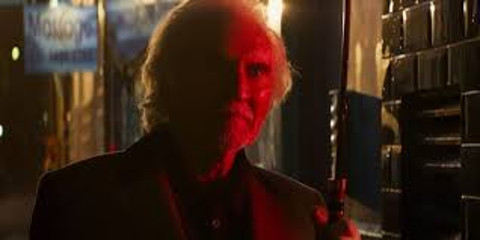
It seems that Jack is indeed sleazy. Sandie wants to start off at the Cade De Paris, but Jack says that she’s aiming too high and gets her to work at this other club. There’s a strange scene where Sandie is a chorus girl in a burlesque revue, and it’s a pretty innocent type of burlesque, yet it’s made to look frightening and extremely demeaning for Sandie which is bizarre seeing as these days burlesque is seen by many women as a means of empowerment. Writers Wright and Krysty Wilson-Cairns should have had her doing something actually provocative to get their point across, and instead just show a very conservative view of sex, something which is creeping more and more into today’s cinema. Take, for example, how little nudity we see now. Still, we do soon after feel rightfully angry as it transpires that Sandie is not living the life she had hoped for, and the horror of this life starts to affect Ellie who’s disturbed by apparitions from the past. Some of these moments, notably one in a library, do scare even though there are too many of them as repetition sets in for a while, while inconsistencies increasingly present themselves. For example, the first few times Eloise goes back in time, she becomes Sandy, but after that she just follows her. It’s never explained why this is the case, but of course we soon realise it’s because some later developments of the plot wouldn’t have worked otherwise! It also seems that Ellie can only see her mum in the room where she died, which initially would seem to explain her visions of Sandie in the bedsit seeing as she it’s soon revealed that Sandie used to sleep there. But at first Ellie only sees Sandie when she falls asleep, unlike her mother, whom she can see while awake, yet later on she does she Sandie while she’s awake. And then Ellie begins to see ghosts all over the place.
One doesn’t of course require explanations for everything, but Wright, as he’s shown before, constructs with carelesslness, though at least here he avoids the grating smugness that he’s sometimes guilty of. And there are one or two surprises in his narrative, one of which did truly work for me. Without giving at all the plot away, right at the end he presents shots of several bloody murders which are jolting in the wrong way because they seem to have come from a different film despite us already having seen one killing, though of course Wright is more interested in mimicking films he likes throughout then to properly shape his story. He’s a bit like Quentin Tarantino, who also partly makes films to tell everyone how much he loves cinema, except that Tarantino was also an innovator and is able to create good characters and dialogue, things that Wright struggles to do. The majority of Wright’s work feels like it could have done with significant polishing by another writer, and this offering is no example, perhaps showcasing his serious limitations as both a writer and a filmmaker more than any other film, especially towards the end where it seems like he’s taking the lazy way out and playing things partly for laughs; at one low point the ghosts pick up the phone to help Eloise call the police. This reveals a certain lack of confidence in the story, not to mention the possibility that, actually, he doesn’t believe particularly strongly in the message about the exploitation of women by men that he’s been trying to get across either.
Saying all that though, this may be the best acted out of all Wright’s work. Thomasin Harcourt McKenzie is tremendously effective as Ellie, making a lot out of yet another lonely outcast type, almost matching her tremendous turn in Jojo Rabbit. As in The Queen’s Gambit Anya Taylor-Joy embodies the quintessential 1960’s bombshell, yet also plays the part with considerable wit despite her character being one that we never get close to which is another major failing of the narrative. Were scenes where we got to know her as a person cut out? In fact were a lot of scenes cut out? ’60s icons Rita Tushingham, Margaret Nolan and Terence Stamp are given decent roles; in fact Stamp is very affecting here because he comes across as a sad refugee from the decade, a decade which we often think of as great, even though its Swinging still went hand in hand with a distinctly male-dominated society. Wright’s knack for choosing songs that both back and inform moments and concerns in his films is very strong here. Tony Hatch’s “Downtown”, sung by Petulia Clark, is kind of the main theme seeing as it’s heard several times, a couple of times by Taylor-Joy herself who also does a very good rendition of the afore-mentioned “You’re My World”. Less familiar tracks from the likes of Dusty Springfield, The Who and The Kinks alternate with a quite evocative score by Steven Price in what is a pretty rich soundtrack. However, the film it supports and guides isn’t rich at all, Wright yet again disappointing considerably even though the material certainly had a lot of potential, meaning that he still has only one satisfying film under his belt, and that’s his first. Wright genuinely seems like a nice guy, and you’ve to love his enthusiasm about movies, but Last Night In Soho is yet more proof that he ain’t that great at making them.












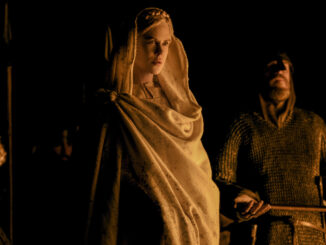
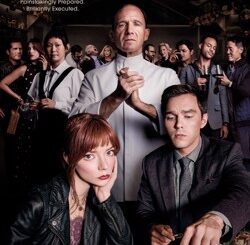
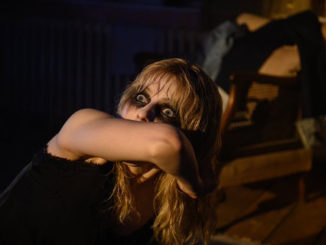
Be the first to comment